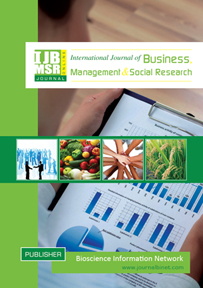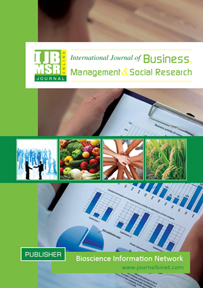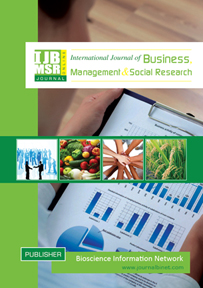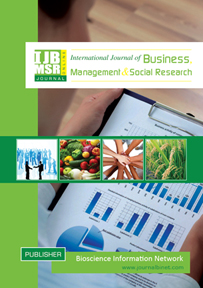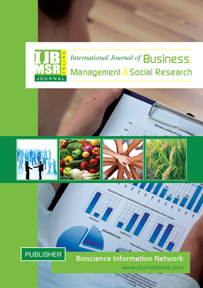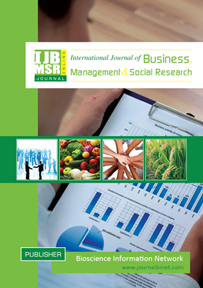International Journal of Business Management and Social Research
Volume 03, Issue 01 | Year of publication: 2016 and 2017
Article Type: Research Article | No. 16 | Country: Indonesia | pp. 140-147 | Open Access
Title: Farmer empowerment through development of ecotecnopreneurship by managing mix farming based on social capital
Author: Santosa, I. and Suyanto, A.
DOI: http://dx.doi.org/10.18801/ijbmsr.030116.16
Title: Farmer empowerment through development of ecotecnopreneurship by managing mix farming based on social capital
Author: Santosa, I. and Suyanto, A.
DOI: http://dx.doi.org/10.18801/ijbmsr.030116.16
Title: Farmer empowerment through development of ecotecnopreneurship by managing mix farming based on social capital
Abstract: This research aimed to study empowerment of farmers through development of ecotechnopreneurship behavior by managing mix farming based on the social capital. Research method used a case study with qualitative and quantitative approach. Locations of research are set intentionally in the Agrotourism Zone of Karangreja District, Purbalingga Regency and Agrotourism Zone Baturaden District, Banyumas Regency, Central Java Province. Based on survey results revealed that social capital have important functions in the process of empowerment of farmers through development of ecotechnopreneurship behavior in managing mix farming. Third element of social capital, that has studied closely related to mutual trust, cooperation networking, social norms and institutitons in the community in two agro zone. However, in some productive activity there is domination of different functions among the three elements.
Key Words: Farmer empowerment, Development, Ecotechnopreneurship and Social capital
Abstract: This research aimed to study empowerment of farmers through development of ecotechnopreneurship behavior by managing mix farming based on the social capital. Research method used a case study with qualitative and quantitative approach. Locations of research are set intentionally in the Agrotourism Zone of Karangreja District, Purbalingga Regency and Agrotourism Zone Baturaden District, Banyumas Regency, Central Java Province. Based on survey results revealed that social capital have important functions in the process of empowerment of farmers through development of ecotechnopreneurship behavior in managing mix farming. Third element of social capital, that has studied closely related to mutual trust, cooperation networking, social norms and institutitons in the community in two agro zone. However, in some productive activity there is domination of different functions among the three elements.
Key Words: Farmer empowerment, Development, Ecotechnopreneurship and Social capital
APA (American Psychological Association)
Santosa, I. & Suyanto, A. (2016). Farmer empowerment through development of ecotecnopreneurship by managing mix farming based on social capital. International Journal of Business, Management and Social Research, 03(01), 140-147.
MLA (Modern Language Association)
Santosa, I. & Suyanto, A. “Farmer empowerment through development of ecotecnopreneurship by managing mix farming based on social capital’’. International Journal of Business, Management and Social Research, 03(01) (2016): 140-147.
Chicago/Turabian
Santosa, I. & Suyanto, A. Farmer empowerment through development of ecotecnopreneurship by managing mix farming based on social capital. International Journal of Business, Management and Social Research, 03, no. (01) (2016): 140-147.
Santosa, I. & Suyanto, A. (2016). Farmer empowerment through development of ecotecnopreneurship by managing mix farming based on social capital. International Journal of Business, Management and Social Research, 03(01), 140-147.
MLA (Modern Language Association)
Santosa, I. & Suyanto, A. “Farmer empowerment through development of ecotecnopreneurship by managing mix farming based on social capital’’. International Journal of Business, Management and Social Research, 03(01) (2016): 140-147.
Chicago/Turabian
Santosa, I. & Suyanto, A. Farmer empowerment through development of ecotecnopreneurship by managing mix farming based on social capital. International Journal of Business, Management and Social Research, 03, no. (01) (2016): 140-147.
Article Type: Research Article | No. 17 | Country: Bangladesh | pp. 148-153 | Open Access
Title: Profitability and productivity of rice production in selected coastal area of Satkhira district in Bangladesh
Author: Md. Zohurul Islam, Ratna Begum, Sajia Sharmin and Akteruzzman Khan
DOI: http://dx.doi.org/10.18801/ijbmsr.030117.17
Title: Profitability and productivity of rice production in selected coastal area of Satkhira district in Bangladesh
Author: Md. Zohurul Islam, Ratna Begum, Sajia Sharmin and Akteruzzman Khan
DOI: http://dx.doi.org/10.18801/ijbmsr.030117.17
Title: Profitability and productivity of rice production in selected coastal area of Satkhira district in Bangladesh
Abstract: The present study was conducted to assess the profitability, constraints and factors affecting rice production in coastal area of Shamnagar upazila, Satkhaira district, Bangladesh by using stratified random sampling method. Simple statistical technique as well as Cobb-Douglas production function was used to achieve the objectives of the study. The study found that the small farmers (Tk. 10292.89) got higher net returns than the medium (Tk. 6894.39) and large (Tk. 4798.70) farmers per hectare, respectively. The undiscounted BCR was 1.38, 1.23 and 1.15 for small, medium and large farmers respectively. It is found that the coefficient of seed, fertilizer, power tiller, irrigation cost and human labor have significantly impact on gross return. Lack of saline tolerable good quality seeds, high price of inputs, low price of outputs and natural calamity were the major problems for rice farming in the study area though rice farming was a profitable enterprise.
Key Words: Rice, Profitability, Productivity and Coastal area
Abstract: The present study was conducted to assess the profitability, constraints and factors affecting rice production in coastal area of Shamnagar upazila, Satkhaira district, Bangladesh by using stratified random sampling method. Simple statistical technique as well as Cobb-Douglas production function was used to achieve the objectives of the study. The study found that the small farmers (Tk. 10292.89) got higher net returns than the medium (Tk. 6894.39) and large (Tk. 4798.70) farmers per hectare, respectively. The undiscounted BCR was 1.38, 1.23 and 1.15 for small, medium and large farmers respectively. It is found that the coefficient of seed, fertilizer, power tiller, irrigation cost and human labor have significantly impact on gross return. Lack of saline tolerable good quality seeds, high price of inputs, low price of outputs and natural calamity were the major problems for rice farming in the study area though rice farming was a profitable enterprise.
Key Words: Rice, Profitability, Productivity and Coastal area
APA (American Psychological Association)
Islam, M. Z., Begum, R., Sharmin, S. and Khan, A. (2017). Profitability and productivity of rice production in selected coastal area of Satkhira district in Bangladesh. International Journal of Business, Management and Social Research, 03(01), 148-153.
MLA (Modern Language Association)
Islam, M. Z., Begum, R., Sharmin, S. and Khan, A. “Profitability and productivity of rice production in selected coastal area of Satkhira district in Bangladesh''. International Journal of Business, Management and Social Research, 03(01) (2017), 148-153.
Chicago and or Turabian
Islam, M. Z., Begum, R., Sharmin, S. and Khan, A. “Profitability and productivity of rice production in selected coastal area of Satkhira district in Bangladesh''. International Journal of Business, Management and Social Research, 03, no. (01) (2017): 148-153.
Islam, M. Z., Begum, R., Sharmin, S. and Khan, A. (2017). Profitability and productivity of rice production in selected coastal area of Satkhira district in Bangladesh. International Journal of Business, Management and Social Research, 03(01), 148-153.
MLA (Modern Language Association)
Islam, M. Z., Begum, R., Sharmin, S. and Khan, A. “Profitability and productivity of rice production in selected coastal area of Satkhira district in Bangladesh''. International Journal of Business, Management and Social Research, 03(01) (2017), 148-153.
Chicago and or Turabian
Islam, M. Z., Begum, R., Sharmin, S. and Khan, A. “Profitability and productivity of rice production in selected coastal area of Satkhira district in Bangladesh''. International Journal of Business, Management and Social Research, 03, no. (01) (2017): 148-153.
Article Type: Research Article | No. 18 | Country: Bangladesh | pp. 154-161 | Open Access
Title: Livelihood status of hill dwellers in Bandarban, Bangladesh
Author: Hossain, M. A. and Ahmad, A.
DOI: http://dx.doi.org/10.18801/ijbmsr.030117.18
Title: Livelihood status of hill dwellers in Bandarban, Bangladesh
Author: Hossain, M. A. and Ahmad, A.
DOI: http://dx.doi.org/10.18801/ijbmsr.030117.18
Title: Livelihood status of hill dwellers in Bandarban, Bangladesh
Abstract: Bandarban hill district is of great importance for growing various crops, which are different from the plains. Farmers practice traditional Jhum culture for their livelihood. They slash and burn the vegetation on hills and go for Jhum cultivation without adopting any conservation measures which contributes to soil and nutrient loss. It can also lead to land degradation as the fallow periods needed for the recovery of natural resource is reduced due to population pressure. A Questionnaire based survey in six upazila of Bandarban revealed that the hill dwellers are lagging behind in education, farming knowledge, access to information on modern culture, modern inputs and government loan facilities. Their food security is at stake as they can seldom produce enough food for their consumption. An eco-efficient smallholder crop production system involving conservation techniques for the sustainable management of vegetation, soil, and water resources in drought-prone hillsides is urgently needed for sustainable livelihood of hill dwellers.
Key Words: Hill dwellers, Jhum culture and Livelihood
Abstract: Bandarban hill district is of great importance for growing various crops, which are different from the plains. Farmers practice traditional Jhum culture for their livelihood. They slash and burn the vegetation on hills and go for Jhum cultivation without adopting any conservation measures which contributes to soil and nutrient loss. It can also lead to land degradation as the fallow periods needed for the recovery of natural resource is reduced due to population pressure. A Questionnaire based survey in six upazila of Bandarban revealed that the hill dwellers are lagging behind in education, farming knowledge, access to information on modern culture, modern inputs and government loan facilities. Their food security is at stake as they can seldom produce enough food for their consumption. An eco-efficient smallholder crop production system involving conservation techniques for the sustainable management of vegetation, soil, and water resources in drought-prone hillsides is urgently needed for sustainable livelihood of hill dwellers.
Key Words: Hill dwellers, Jhum culture and Livelihood
APA (American Psychological Association)
Hossain, M. A. and Ahmad, A. (2017). Livelihood status of hill dwellers in Bandarban, Bangladesh. International Journal of Business, Management and Social Research, 03(01), 154-161.
MLA (Modern Language Association)
Hossain, M. A. and Ahmad, A. “Livelihood status of hill dwellers in Bandarban, Bangladesh’’. International Journal of Business, Management and Social Research, 03(01) (2017): 154-161.
Chicago and or Turabian
Hossain, M. A. and Ahmad, A. Livelihood status of hill dwellers in Bandarban, Bangladesh. International Journal of Business, Management and Social Research, 03, no. (01) (2017): 154-161.
Hossain, M. A. and Ahmad, A. (2017). Livelihood status of hill dwellers in Bandarban, Bangladesh. International Journal of Business, Management and Social Research, 03(01), 154-161.
MLA (Modern Language Association)
Hossain, M. A. and Ahmad, A. “Livelihood status of hill dwellers in Bandarban, Bangladesh’’. International Journal of Business, Management and Social Research, 03(01) (2017): 154-161.
Chicago and or Turabian
Hossain, M. A. and Ahmad, A. Livelihood status of hill dwellers in Bandarban, Bangladesh. International Journal of Business, Management and Social Research, 03, no. (01) (2017): 154-161.
Article Type: Research Article | No. 19 | Country: Malaysia | pp. 162-178 | Open Access
Title: Fiscal operations and macroeconomic growth: The Nigerian experience
Author: Idris, M. and Bakar, R.
DOI: http://dx.doi.org/10.18801/ijbmsr.030117.19
Title: Fiscal operations and macroeconomic growth: The Nigerian experience
Author: Idris, M. and Bakar, R.
DOI: http://dx.doi.org/10.18801/ijbmsr.030117.19
Title: Fiscal operations and macroeconomic growth: The Nigerian experience
Abstract: Over the years in Nigeria, the trend of fiscal expenditure continues to increase rapidly without any corresponding increase in the level of revenue. This scenario had deteriorated the fiscal stability resulting in high rates of deficits and domestic debt, as well as inducing more inflationary pressure within the market-oriented economy. In view of the decreasing price of crude oil in the international market accompanied by lower revenue generation, the rising inflationary pressure has continued to serve as a major obstacle to ensuring sustainable growth in Nigeria. With the monetary policy being constrained in addressing this problem as a result of the prevailing exchange rate regimes which adversely affect the activities of the commercial banks, this gave fiscal policy the opportunity to carry the main task of macroeconomic stabilisation in Nigeria. It is in view of this background that this paper is aimed at evaluating the effects of fiscal operations on macroeconomic growth in Nigeria. Enormous literature related to fiscal operations in both developed and developing countries are reviewed, and the trends of fiscal variables are also presented. The paper adopted a descriptive method and utilised both charts and table to show the trend of fiscal elements with the aim of determining the relationship between the variables. The paper concludes that fiscal operation is ineffective in providing the needed macroeconomic environment for sustainable growth. Therefore, there is a need for government to reduce the size of its deficits, broaden the revenue base by increasing the contribution from non-oil sources, and synchronise both monetary and fiscal policies in order to attain the desired level of sustainable growth.
Key Words: Fiscal operations, Macroeconomic growth, Fiscal policy and Monetary policy
Abstract: Over the years in Nigeria, the trend of fiscal expenditure continues to increase rapidly without any corresponding increase in the level of revenue. This scenario had deteriorated the fiscal stability resulting in high rates of deficits and domestic debt, as well as inducing more inflationary pressure within the market-oriented economy. In view of the decreasing price of crude oil in the international market accompanied by lower revenue generation, the rising inflationary pressure has continued to serve as a major obstacle to ensuring sustainable growth in Nigeria. With the monetary policy being constrained in addressing this problem as a result of the prevailing exchange rate regimes which adversely affect the activities of the commercial banks, this gave fiscal policy the opportunity to carry the main task of macroeconomic stabilisation in Nigeria. It is in view of this background that this paper is aimed at evaluating the effects of fiscal operations on macroeconomic growth in Nigeria. Enormous literature related to fiscal operations in both developed and developing countries are reviewed, and the trends of fiscal variables are also presented. The paper adopted a descriptive method and utilised both charts and table to show the trend of fiscal elements with the aim of determining the relationship between the variables. The paper concludes that fiscal operation is ineffective in providing the needed macroeconomic environment for sustainable growth. Therefore, there is a need for government to reduce the size of its deficits, broaden the revenue base by increasing the contribution from non-oil sources, and synchronise both monetary and fiscal policies in order to attain the desired level of sustainable growth.
Key Words: Fiscal operations, Macroeconomic growth, Fiscal policy and Monetary policy
APA (American Psychological Association)
Idris, M. and Bakar, R. (2017). Fiscal operations and macroeconomic growth: The Nigerian experience. International Journal of Business, Management and Social Research, 03(01), 162-178.
MLA (Modern Language Association)
Idris, M. and Bakar, R. “Fiscal operations and macroeconomic growth: The Nigerian experience’’. International Journal of Business, Management and Social Research, 03(01) (2017): 162-178.
Chicago and or Turabian
Idris, M. and Bakar, R. Fiscal operations and macroeconomic growth: The Nigerian experience. International Journal of Business, Management and Social Research, 03, no. (01) (2017): 162-178.
Idris, M. and Bakar, R. (2017). Fiscal operations and macroeconomic growth: The Nigerian experience. International Journal of Business, Management and Social Research, 03(01), 162-178.
MLA (Modern Language Association)
Idris, M. and Bakar, R. “Fiscal operations and macroeconomic growth: The Nigerian experience’’. International Journal of Business, Management and Social Research, 03(01) (2017): 162-178.
Chicago and or Turabian
Idris, M. and Bakar, R. Fiscal operations and macroeconomic growth: The Nigerian experience. International Journal of Business, Management and Social Research, 03, no. (01) (2017): 162-178.
Volume 03, Issue 02 | Year of publication: 2017
Article Type: Research Article | No. 20 | Country: Kenya | pp. 179-185 | Open Access
Title: Influence of motivation on employee performance: a case of national bank of Kenya
Author: Gachengo, V. and Wekesa, S.
DOI: http://dx.doi.org/10.18801/ijbmsr.030217.20
Title: Influence of motivation on employee performance: a case of national bank of Kenya
Author: Gachengo, V. and Wekesa, S.
DOI: http://dx.doi.org/10.18801/ijbmsr.030217.20
Title: Influence of motivation on employee performance: a case of national bank of Kenya
Abstract: The aim of this study was to find out the effect of motivation on employee performance of National Bank of Kenya. In respect to this, the key factor influencing motivation specifically training, reward systems; performance appraisals and work-life balance were analyzed. The study findings would assist human resource managers, employees of NBK, scholars, policy makers and other relevant decision makers to establish mechanisms of how to deal with the motivation of employees to improve performance and its effects. The study adopted descriptive design. The target population comprised of the management officials and subordinate officials totaling to 124. Stratified random sampling was adopted to select a sample size of 95 respondents. Questionnaires were used as the main data collection instrument with which were personally administered by the researcher. Data analysis was done using descriptive and inferential statistics aided with SPSS Version 21. Descriptive statistics, involved mean, standard deviation, frequency distribution and percentages while for inferential statistics involved bivariate correlation and Multi regression analysis. The study found out that motivation had a statistically significant influence on employee performance at the National Bank of Kenya.
Key Words: Motivation, Employee performance, Rewards, Training and Performance appraisal
Abstract: The aim of this study was to find out the effect of motivation on employee performance of National Bank of Kenya. In respect to this, the key factor influencing motivation specifically training, reward systems; performance appraisals and work-life balance were analyzed. The study findings would assist human resource managers, employees of NBK, scholars, policy makers and other relevant decision makers to establish mechanisms of how to deal with the motivation of employees to improve performance and its effects. The study adopted descriptive design. The target population comprised of the management officials and subordinate officials totaling to 124. Stratified random sampling was adopted to select a sample size of 95 respondents. Questionnaires were used as the main data collection instrument with which were personally administered by the researcher. Data analysis was done using descriptive and inferential statistics aided with SPSS Version 21. Descriptive statistics, involved mean, standard deviation, frequency distribution and percentages while for inferential statistics involved bivariate correlation and Multi regression analysis. The study found out that motivation had a statistically significant influence on employee performance at the National Bank of Kenya.
Key Words: Motivation, Employee performance, Rewards, Training and Performance appraisal
APA (American Psychological Association)
Gachengo, V. and Wekesa, S. (2017). Influence of motivation on employee performance: a case of national bank of Kenya. International Journal of Business, Management and Social Research, 03(02), 179-185.
MLA (Modern Language Association)
Gachengo, V. and Wekesa, S. “Influence of motivation on employee performance: a case of national bank of Kenya’’. International Journal of Business, Management and Social Research, 03(02) (2017): 179-185.
Chicago and or Turabian
Gachengo, V. and Wekesa, S. Influence of motivation on employee performance: a case of national bank of Kenya. International Journal of Business, Management and Social Research, 03, no. (02) (2017): 179-185.
Gachengo, V. and Wekesa, S. (2017). Influence of motivation on employee performance: a case of national bank of Kenya. International Journal of Business, Management and Social Research, 03(02), 179-185.
MLA (Modern Language Association)
Gachengo, V. and Wekesa, S. “Influence of motivation on employee performance: a case of national bank of Kenya’’. International Journal of Business, Management and Social Research, 03(02) (2017): 179-185.
Chicago and or Turabian
Gachengo, V. and Wekesa, S. Influence of motivation on employee performance: a case of national bank of Kenya. International Journal of Business, Management and Social Research, 03, no. (02) (2017): 179-185.
Article Type: Research Article | No. 21 | Country: Nigeria | pp. 186-191 | Open Access
Title: Training skill needs of secondary school agricultural science graduate in fish farming in Ebonyi state, Nigeria
Author: Ituma, O. E. and Ukah, N. J.
DOI: http://dx.doi.org/10.18801/ijbmsr.030217.21
Title: Training skill needs of secondary school agricultural science graduate in fish farming in Ebonyi state, Nigeria
Author: Ituma, O. E. and Ukah, N. J.
DOI: http://dx.doi.org/10.18801/ijbmsr.030217.21
Title: Training skill needs of secondary school agricultural science graduate in fish farming in Ebonyi state, Nigeria
Abstract: The study identified training skill needs of Secondary School Agricultural Science Graduates in Fish farming in Ebonyi State. The secondary school graduate was on increase yearly and yet unemployed, but without employable training skills, to reduce unemployment in Ebonyi State. The study was carried out in three agricultural zone, in Ebonyi State. Descriptive survey research design was adopted for the study. The population for the study was (185) made up of 150 agricultural science teachers, 25 fish farmers in the 3 agricultural zones and 10 extension agents. There is no sampling because of its manageable population. Four research questions was formulated to guided the study. The instrument used in data collection was structured questionnaire developed by the researcher. The instrument was validated by 3 experts, one in measurement and evaluation, in Science Education Department and two in Technology and Vocational Education Department, Agricultural Education unit in the sane faculty and university. Cronbach alpha reliability coefficient was used to test for the internal consistency of the instrument, which yielded 0.79. The instrument was administered to the respondents with the help of three research assistants, one in each agricultural zone. The data collected were analyzed using mean score and standard deviations. The results in table 1, 2, 3 all the items were needed with mean score of 2.50 and above while in table 4, two item 6 and 7 statement scored below 2.50, which was not needed, as training skills. Among the recommendations made was that government should use the identified training skills in training unemployed youth in fish farming in three agricultural zones in Ebonyi state.
Key Words: Training skills, Secondary school, Agricultural graduate and Fish farming
Abstract: The study identified training skill needs of Secondary School Agricultural Science Graduates in Fish farming in Ebonyi State. The secondary school graduate was on increase yearly and yet unemployed, but without employable training skills, to reduce unemployment in Ebonyi State. The study was carried out in three agricultural zone, in Ebonyi State. Descriptive survey research design was adopted for the study. The population for the study was (185) made up of 150 agricultural science teachers, 25 fish farmers in the 3 agricultural zones and 10 extension agents. There is no sampling because of its manageable population. Four research questions was formulated to guided the study. The instrument used in data collection was structured questionnaire developed by the researcher. The instrument was validated by 3 experts, one in measurement and evaluation, in Science Education Department and two in Technology and Vocational Education Department, Agricultural Education unit in the sane faculty and university. Cronbach alpha reliability coefficient was used to test for the internal consistency of the instrument, which yielded 0.79. The instrument was administered to the respondents with the help of three research assistants, one in each agricultural zone. The data collected were analyzed using mean score and standard deviations. The results in table 1, 2, 3 all the items were needed with mean score of 2.50 and above while in table 4, two item 6 and 7 statement scored below 2.50, which was not needed, as training skills. Among the recommendations made was that government should use the identified training skills in training unemployed youth in fish farming in three agricultural zones in Ebonyi state.
Key Words: Training skills, Secondary school, Agricultural graduate and Fish farming
APA (American Psychological Association)
Ituma, O. E. and Ukah, N. J. (2017). Training skill needs of secondary school agricultural science graduate in fish farming in Ebonyi state, Nigeria. International Journal of Business, Management and Social Research, 03(02), 186-191.
MLA (Modern Language Association)
Ituma, O. E. and Ukah, N. J. “Training skill needs of secondary school agricultural science graduate in fish farming in Ebonyi state, Nigeria’’. International Journal of Business, Management and Social Research, 03(02) (2017): 186-191.
Chicago and or Turabian
Ituma, O. E. and Ukah, N. J. Training skill needs of secondary school agricultural science graduate in fish farming in Ebonyi state, Nigeria. International Journal of Business, Management and Social Research, 03, no. (02) (2017): 186-191
Ituma, O. E. and Ukah, N. J. (2017). Training skill needs of secondary school agricultural science graduate in fish farming in Ebonyi state, Nigeria. International Journal of Business, Management and Social Research, 03(02), 186-191.
MLA (Modern Language Association)
Ituma, O. E. and Ukah, N. J. “Training skill needs of secondary school agricultural science graduate in fish farming in Ebonyi state, Nigeria’’. International Journal of Business, Management and Social Research, 03(02) (2017): 186-191.
Chicago and or Turabian
Ituma, O. E. and Ukah, N. J. Training skill needs of secondary school agricultural science graduate in fish farming in Ebonyi state, Nigeria. International Journal of Business, Management and Social Research, 03, no. (02) (2017): 186-191

